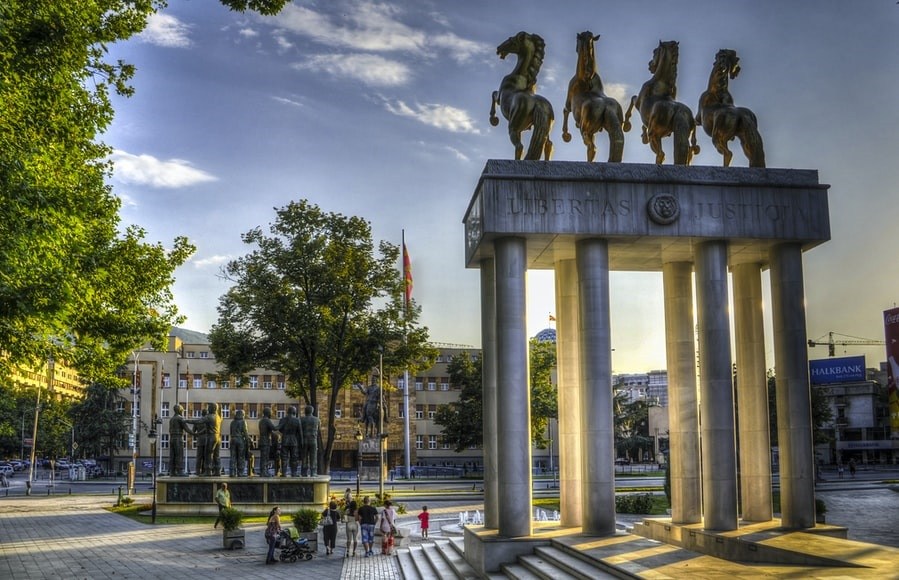The recent EU-WB summit hosted by the Slovenian EU presidency did not result in the expected breakthrough in the enlargement process because Albania and North Macedonia are held hostages to a strange dispute which was sparked by Bulgaria in late 2020.
Bulgaria and Romania joined the EU in 2007, after the big bang in 2004 when 10 candidate countries became EU member states. In fact, they were not ready for the EU in 2007 but had been promised membership. They are still subject to the so-called Cooperation and Verification mechanism which continues to monitor progress and unfinished reforms in the fields of judicial reform, corruption and (for Bulgaria) organised crime.
The EU agreed already in March 2020 on opening negotiations with Albania and North Macedonia but has until now failed to set a fixed date for them. The Slovenian presidency, taking over after Portugal, hoped to organise the first intergovernmental conferences with Albania and North Macedonia and start the accession negotiations with them. Instead, the summit continued to be overshadowed by internal divides in the Western Balkans.
Bulgaria used its veto to oppose the start of formal negotiations with North Macedonia because of national narratives concerning history and language. This prevents also the start of negotiations with Albania although the candidate countries are supposed to advance in the accession process in their own pace, based on their own merits. Optimistically, negotiations could start before the end of the year but this would require that the dispute between North Macedonia and Bulgaria is solved by then.
Even experts on Western Balkans and its history have some difficulty to understand what the dispute is all about and why it has become an obstacle in the enlargement process. Especially, North Macedonia has been waiting for years for the start of formal negotiations after the European Commission had assessed its readiness and recommended that negotiations should start.
Macedonia gained its independence in September 1991 after the breakup of former Yugoslavia and a referendum where 95 % voted for independence. It applied for EU membership already in 2004 but for years negotiations were blocked by another neighbour, Greece, because of the name issue. Only in 2020 did EU approve the formal start of accession negotiations after the issue had been resolved and “FYROM” (Former Yugoslav Republic of Macedonia) was replaced by the name North Macedonia.
An apparently simple but emotional issue was at last solved by direct contacts between the two countries and the help of a mediator appointed by the UN. In the current dispute with Bulgaria, both the Slovenian EU presidency and its predecessor Portugal committed themselves to advance the process. Portugal is reported to have a drafted a document for the two sides to consider but it apparently failed to bridge the gap between them and has not become publicly available.
What is the European Commission doing? Not very much concretely, besides speeches on the European perspective of the candidate countries, visits to North Macedonia and Bulgaria by the Commission President and the Commissioner in charge of enlargement, with calls to them to solve their dispute. It is not using its huge leverage to put pressure on them for a mutually acceptable solution and is hardly mentioning the dispute in the annual country reports on the progress made.
Friendship agreement
In its latest country report last year, the Commission stated that there was a particular focus on the Treaty of Friendship, Good Neighbourliness and Cooperation signed between the two countries in 2017, including meetings between them. The treaty was ratified by their parliaments in 2018 and has resulted in a high number of cooperation agreements. It therefore came as a surprise that Bulgaria only a month after the country report blocked the start of accession negotiations.
A logical starting point for a solution is indeed the Treaty of Friendship, Good Neighbourliness and Cooperation which the two countries have signed. The agreement recognizes the “common history that connects the two countries and their peoples” and commits them not to “undertake, encourage or support any action directed against the other country which is of a hostile nature”.
They also committed themselves “not to make territorial claims against each other.” Bulgaria welcomed the aspirations of Macedonia to join the EU and NATO. While both countries “have the right to protect the rights and interests of its nationals in the territory of the other Contracting Party in accordance with international law”, North Macedonia went a step further and affirmed that it would not interfere in the internal affairs of Bulgaria.
The issue of the status of national minorities in both countries is apparently an issue of concern. North Macedonia is by definition a multi-ethnic country with a number of minority groups, in particular Albanians.
While the number of Bulgarians in North Macedonia is small and not explicitly mentioned in the Macedonian constitution, a significant Macedonian minority is living in Bulgaria but does not appear any longer in population statistics. This minority group claims that its right to national self-identification, including language and cultural rights, is denied.
The main sticking points are ideological by nature and relate to their common history, which for hundreds of years took place in the Ottoman empire, and the roots of the Macedonian language. To bridge their national narratives, the Friendship agreement stipulated the establishment of a Joint Multidisciplinary Expert Commission on “Historical and Educational Issues to contribute to an objective and based on authentic and evidence-based historical sources, scientific interpretation of historical events”.
The results of the meetings of the Expert Commission have not been published but according to a Macedonian diplomatic source it did lead to a series of meetings and produced two reports, although not on language and culture that were outside the scope of the Commission. Apparently, they were considered too contentious. No comment was received in time from the Bulgarian side.
The first report was endorsed by the two governments and the endorsement of the second is in process. According to the Macedonian source, this type of Commissions, dealing with history, need time to produce a result having in mind the complexity of historical processes in Europe.
Next country report by the Commission is due to be published on 19 October. Expectations are high that it will include some kind of analyse of the dispute and how it can be solved constructively and swiftly. The Commission may be unwilling to link the dispute with the enlargement process but has no choice for two reasons. First, the dispute has become a real obstacle and, second, the EU, with lessons learned from other disputes, has no interest in accepting countries into its family with unsolved bilateral issues.
The Commission has stated numerous times that it wants the dispute between the two countries to be resolved and that North Macedonia has fulfilled the conditions to start the EU membership negotiation as soon as possible. It risks losing its credibility if it cannot make use of its famous diplomatic toolbox and contribute actively to resolve a dispute in Western Balkans, its immediate geopolitical neighborhood surrounded by member states.
Mose Apelblat is a freelance journalist and a former official in the Swedish public administration and at the European Commission where he worked with policy coordination of public administration reform in the candidate countries.


